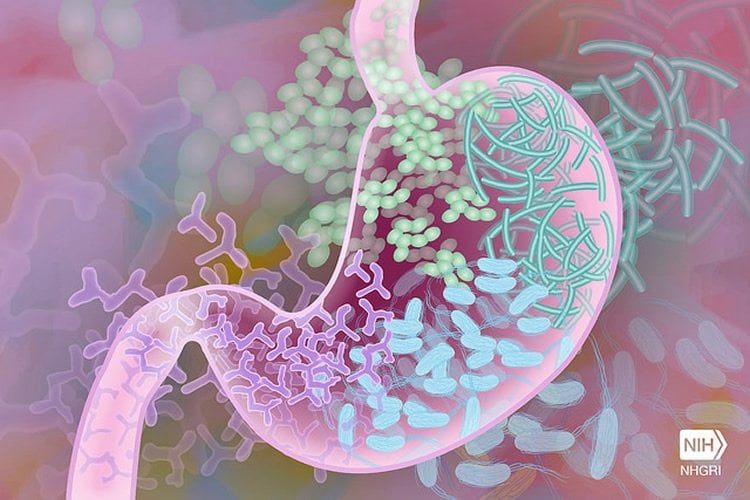Summary: Researchers have identified a mechanism by which immune system problems can cause commensal dysbiosis, which promotes age related pathologies.
Source: EPFL.
Over the years, researchers have learned that the different populations of bacteria that inhabit the gut have significant effects on body functions, including the immune system. The populations of gut bacteria are sometimes called “commensal,” and exist in virtually all animals living under a certain functional balance. When this balance is disrupted—for example, because of disease or medication—it gives rise to a condition known as “commensal dysbiosis,” which is associated with a number of pathologies and even a decreased lifespan. Despite this knowledge, little is known about how, exactly, the gut bacteria affect general health and vice versa.
Now, Igor Iatsenko, a scientist from the lab of Bruno Lemaitre at EPFL’s Global Health Institute, has discovered a mechanism by which problems of the immune system can cause commensal dysbiosis, which promotes age-related pathologies.
The team used the fruit-fly Drosophila melanogaster, which is often used to study the biology of gut bacteria. Because they wanted to explore the interplay between gut bacteria and the immune system, they focused on a receptor protein called peptidoglycan recognition protein SD (PGRP-SD). This protein belongs to a class of pattern-recognition receptors, and in 2016, Igor Iatsenko had showed that PGRP-SD detects foreign bacterial pathogens and turns the fly’s immune system against them.
In the present study, the scientists turned off the gene for PGRP-SD, thus creating flies with disrupted immune systems. The mutant flies proved to have shorter lifespans than normal ones, and when the researchers examined them, they found that they also had an abnormally high number of the gut bacterium Lactobacillus plantarum.
Looking into the biological impact, the scientists found that the bacteria produced an excessive amount of lactic acid. This, in turn, triggered the generation of reactive oxygen species, which cause damage to cells and contribute to the aging of tissues. In contrast, when the scientists increased the production of PGRP-SD, they found that it prevented commensal dysbiosis, and even extended the lifespan of the flies.

“Here, we have a metabolic interplay between the commensal bacteria and the host,” says Bruno Lemaitre. “Lactic acid, a metabolite produced by the bacterium Lactobacillus plantarum, is incorporated and processed in the fly intestine, with the side-effect of producing reactive oxygen species that promote epithelial damage.” The researchers speculate that similar mechanisms are taking place in the mammalian intestine.
“Our study identifies a specific microbiota member and its metabolite that can influence aging in the host organism,” says Igor Iatsenko. “There are definitely many more examples like this, and a better understanding of host-microbiota metabolic interactions during aging is needed in order to develop strategies against age-associated pathologies.”
Source: EPFL
Publisher: Organized by NeuroscienceNews.com.
Image Source: NeuroscienceNews.com image is in the public domain.
Original Research: Abstract for “Microbiota-Derived Lactate Activates Production of Reactive Oxygen Species by the Intestinal NADPH Oxidase Nox and Shortens Drosophila Lifespan” by Igor Iatsenko, Jean-Philippe Boquete, and Bruno Lemaitre in Immunity. Published November 13 2018.
doi:10.1016/j.immuni.2018.09.017
[cbtabs][cbtab title=”MLA”]EPFL”Immunity Connects Gut Bacteria and Aging.” NeuroscienceNews. NeuroscienceNews, 13 November 2018.
<https://neurosciencenews.com/microbiome-aging-immunity-10188/>.[/cbtab][cbtab title=”APA”]EPFL(2018, November 13). Immunity Connects Gut Bacteria and Aging. NeuroscienceNews. Retrieved November 13, 2018 from https://neurosciencenews.com/microbiome-aging-immunity-10188/[/cbtab][cbtab title=”Chicago”]EPFL”Immunity Connects Gut Bacteria and Aging.” https://neurosciencenews.com/microbiome-aging-immunity-10188/ (accessed November 13, 2018).[/cbtab][/cbtabs]
Abstract
Microbiota-Derived Lactate Activates Production of Reactive Oxygen Species by the Intestinal NADPH Oxidase Nox and Shortens Drosophila Lifespan
Commensal microbes colonize the gut epithelia of virtually all animals and provide several benefits to their hosts. Changes in commensal populations can lead to dysbiosis, which is associated with numerous pathologies and decreased lifespan. Peptidoglycan recognition proteins (PGRPs) are important regulators of the commensal microbiota and intestinal homeostasis . Here, we found that a null mutation in Drosophila PGRP-SD was associated with overgrowth of Lactobacillus plantarum in the fly gut and a shortened lifespan. L. plantarum-derived lactic acid triggered the activation of the intestinal NADPH oxidase Nox and the generation of reactive oxygen species (ROS). In turn, ROS production promoted intestinal damage, increased proliferation of intestinal stem cells, and dysplasia. Nox-mediated ROS production required lactate oxidation by the host intestinal lactate dehydrogenase, revealing a host-commensal metabolic crosstalk that is probably broadly conserved. Our findings outline a mechanism whereby host immune dysfunction leads to commensal dysbiosis that in turn promotes age-related pathologies.






